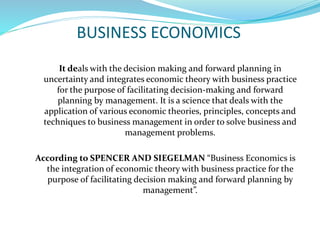Key Challenges Facing Business and Economics in the Post-COVID Era
Key Challenges Facing Business and Economics in the Post-COVID Era
Blog Article
Recognizing Financial Principles for Better Company Decision-Making
In the complicated landscape of modern business, a complete understanding of financial principles can significantly boost decision-making processes. By analyzing factors such as market frameworks and consumer habits, organizations can customize their techniques to align with affordable dynamics and consumer demands. In addition, insights into need elasticity and possibility costs provide a structure for optimizing source allowance. Nevertheless, the application of these economic theories often exposes unexpected obstacles and chances that can redefine strategic approaches. What implications do these understandings hold for the future of service approach?
The Fundamentals of Economic Theory
Economic concept works as the structure for understanding exactly how people and companies make choices in the presence of scarcity. At its core, economic theory takes a look at the appropriation of limited resources to satisfy limitless wants. This fundamental principle of shortage requires trade-offs, compelling decision-makers to examine the advantages and expenses connected with different options.
The 2 main branches of financial concept are macroeconomics and microeconomics. Microeconomics concentrates on specific representatives, such as customers and firms, assessing their actions and communications in certain markets. It highlights ideas like supply and demand, cost elasticity, and market equilibrium, which are essential for understanding how prices are established and just how sources are dispersed.
On the other hand, macroeconomics analyzes the economic climate all at once, dealing with broader concerns such as rising cost of living, unemployment, and economic growth. It offers insights into systemic phenomena that influence all economic agents, leading policymakers in crafting efficient economic methods.
Eventually, a solid grounding in financial theory is important for reliable service decision-making. By understanding the concepts of shortage, trade-offs, and market dynamics, companies can much better make and browse complicated environments notified choices that boost their affordable advantage.
Trick Economic Indicators
Secret financial signs offer as vital tools for examining the health and wellness and instructions of an economic climate, supplying important understandings for company decision-making. These indications are quantitative procedures that reflect the economic efficiency and can be categorized right into leading, lagging, and coincident indications.
Leading signs, such as customer confidence indexes and stock exchange patterns, forecast future economic activity, permitting businesses to anticipate modifications on the market. Delaying indications, like unemployment rates and business earnings, provide insights right into the economic climate's previous performance, helping businesses to assess lasting fads. Coincident indicators, such as GDP growth and retail sales, change all at once with the economic climate, supplying a real-time snapshot of economic conditions.
Recognizing these indicators enables organizations to make enlightened choices pertaining to investments, source allowance, and calculated planning. By closely checking these crucial economic indicators, companies can navigate unpredictabilities and position themselves effectively in the ever-changing financial landscape, ultimately boosting their decision-making processes and long-term success.

Market Frameworks and Characteristics
Comprehending market frameworks and characteristics is important for organizations aiming to prosper in affordable environments. Market structures, extensively classified into best competitors, monopolistic competition, oligopoly, and monopoly, substantially affect pricing techniques, item distinction, and affordable actions. Each framework provides one-of-a-kind obstacles and possibilities that can dictate a company's calculated direction.
In ideal competitors, numerous little companies complete, resulting in very little prices power and uniform items. Alternatively, in monopolistic competitors, companies separate their items, enabling for some level of rates power while still encountering competitors. Oligopolies, identified by a couple of leading gamers, lead to interdependent decision-making; companies should very carefully consider rivals' feedbacks to their activities. Ultimately, monopolies exist when a solitary firm manages the market, leading to maximum pricing power but frequently attracting regulatory scrutiny.
Understanding these characteristics makes it possible for services to anticipate market patterns, adjust approaches, and enhance resource appropriation. Furthermore, recognizing just how outside factors like modern technology and policy impact these frameworks can enhance critical planning. By mastering market structures and characteristics, firms can make enlightened decisions, inevitably enhancing their affordable position and driving lasting growth.
Customer Actions Insights
Consumer actions plays an essential duty fit organization approaches and results. Understanding exactly how customers make purchasing choices, their choices, and the elements affecting their behavior can substantially boost a company's capacity to meet market demands. Trick insights into customer actions can be originated from examining demographics, psychographics, and behavior patterns.
Demographic elements such as age, income, gender, and education and learning level supply a fundamental understanding of target audience. Psychographics dive deeper, exploring consumers' perspectives, worths, and lifestyles, which can affect brand commitment and item assumption. Behavioral understandings, such as purchasing regularity and feedback to promos, are important for tailoring advertising and marketing initiatives.
Furthermore, outside aspects like economic conditions, cultural trends, and technological advancements additionally influence customer selections. As an example, throughout economic recessions, consumers might focus on necessary products over high-end items, altering need patterns.
Applying Business Economics to Method
Insights got from customer actions contribute in developing effective business approaches. By leveraging economic principles, organizations can much better understand market characteristics, enhance resource appropriation, and improve competitive placing. Evaluating need elasticity, for example, makes it possible for firms to readjust prices strategies to optimize income while continuing to be appealing to customers.
Furthermore, recognizing market segmentation permits services to customize their offerings, ensuring they fulfill the particular demands and preferences of varied consumer teams. Business and Economics. This targeted approach improves consumer satisfaction and promotes brand name commitment

Incorporating video game concept right into tactical planning additionally gives understandings into competitive actions, permitting see this page companies to anticipate rival activities and design counter-strategies successfully.

Verdict
To conclude, a comprehensive understanding of financial concepts significantly enhances business decision-making. By checking out market structures, reviewing consumer actions, and analyzing vital economic indications, his explanation companies can develop effective methods that straighten with market needs. The application of concepts such as demand elasticity and possibility prices further aids in maximizing resource appropriation and investment decisions. Eventually, incorporating these financial concepts cultivates boosted strategic choices, helping with much better expectancy of market trends and competitive actions, thus driving success.
In the complicated landscape of modern business, a comprehensive understanding of economic concepts can dramatically boost decision-making processes.Leading indicators, such as customer self-confidence indexes and stock market trends, forecast future financial activity, allowing businesses to prepare for modifications in the market. By closely keeping an eye on these essential economic indications, companies can navigate unpredictabilities view publisher site and position themselves efficiently in the ever-changing economic landscape, eventually enhancing their decision-making procedures and long-lasting success.
By leveraging economic concepts, companies can much better comprehend market dynamics, enhance resource appropriation, and improve competitive placing.In final thought, a comprehensive understanding of financial concepts considerably enhances service decision-making.
Report this page